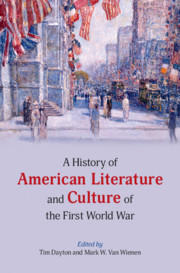Book contents
- A History of American Literature and Culture of the First World War
- A History of American Literature and Culture of the First World War
- Copyright page
- Contents
- Figures
- Contributors
- Acknowledgments
- Introduction America’s Great War at One Hundred (and Counting)
- Part I Genre and Medium
- Part II Settings and Subjects
- Part III Transformations
- Chapter 22 The Nation
- Chapter 23 Free Speech
- Chapter 24 Labor
- Chapter 25 The Veteran
- Chapter 26 The Military-Industrial Complex
- Chapter 27 The World
- References
- Index
Chapter 24 - Labor
From Replaceable Cogs to Corporate Citizens
from Part III - Transformations
Published online by Cambridge University Press: 23 January 2021
- A History of American Literature and Culture of the First World War
- A History of American Literature and Culture of the First World War
- Copyright page
- Contents
- Figures
- Contributors
- Acknowledgments
- Introduction America’s Great War at One Hundred (and Counting)
- Part I Genre and Medium
- Part II Settings and Subjects
- Part III Transformations
- Chapter 22 The Nation
- Chapter 23 Free Speech
- Chapter 24 Labor
- Chapter 25 The Veteran
- Chapter 26 The Military-Industrial Complex
- Chapter 27 The World
- References
- Index
Summary
This chapter explores the transformation of the world of the American worker wrought by the Great War.Before the war, American industry demanded an endless supply of cheap labor. This imperative structured all aspects of working-class life——labor conditions and pay, home and neighborhood, politics and labor organization, and even its heterogenous racial and national composition. It had brought into being a working class at once within and apart from mainstream America. The economic and political forces unleashed by the Great War made America’s workers both the objects and agents of immense change. With the drastic curtailment of immigration caused by wartime conditions, workers could no longer be viewed as replaceable cogs, mere labor inputs in the production process. Neither could the insularity of their communities be tolerated, for during war, government and industry demanded loyalty, even active allegiance. Yet workers seized on the possibilities presented by the war in a bid to chart their own course. Emerging from this maelstrom was a dramatically different relationship between workers, on one hand, and business and government, on the other, ending the epoch of mass immigration and putting in place the beginnings of a labor system that valued long-term employment and worker loyalty.
Keywords
- Type
- Chapter
- Information
- Publisher: Cambridge University PressPrint publication year: 2021

